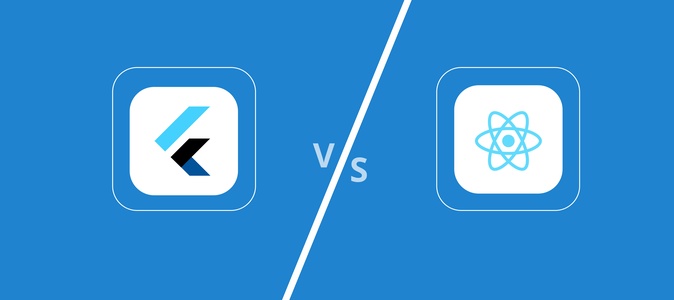Flutter vs React Native - The framework you should choose in 2023

Share This Article
Why to choose react native and how to make your react native application a success
Table of Contents
Subscribe to Our Blog
We're committed to your privacy. SayOne uses the information you provide to us to contact you about our relevant content, products, and services. check out our privacy policy.
App development is directed by how quickly it can make it to the market and how you can reduce cost with cross-platform development - but the first question you ask yourself is which technology to choose?
In this blog, we help you identify which among Flutter or React Native fits the requirement for your app development.
Things to know - Flutter
Flutter is a UI framework developed by Google. It is open-source and offers a comprehensive development environment complete with widgets and tools.
Flutter upped the game of cross-platform app development as it gave developers highly flexible tools to build and deploy natively compiled across iOS and Android platforms using a single codebase. A part of Flutter's success is due to how easily developers can create visually stunning applications in absolutely record time compared to other frameworks.
-
Flutter runs on Dart, which is a fast, object-oriented programming language. It is easy to learn for developers who are familiar with Java and C#.
-
The architecture is based on reactive programming, which is similar to React.
-
It has a rich library of widgets and customizable UI elements drawn on its rendering engine, offering speed and great visual aesthetics.
Popular Apps on Flutter
Google Ads app
Xianyu app by Alibaba - One of the biggest eCommerce platform in the world
Hamilton app- Official app of the Broadway musical - and a list that goes on.
Read also: How Much Does It Cost to Develop and Maintain a Flutter App?
Things to know - React Native
React Native is a cross-platform framework developed by Facebook. It offers a cross-platform development environment for building apps for Android and iOS platforms using a single codebase. React Native uses the UI building blocks that are native to iOS and Android apps.
-
React Native runs on the very popular Javascript.
-
It uses visual elements called components that are similar to widgets in Flutter.
-
It's best to use external libraries to develop web and desktop applications with React Native.
Popular Apps on React Native
Pinterest - and many more.
Flutter - Strength
1- Hot Reload
This feature has been one of the greatest strengths of Flutter. Hot Reload is one of the prime reasons that make app development in Flutter faster and more dynamic. The hot reload feature helps developers to make changes and reflect them immediately. Developers can fix bugs, experiment with new features in an instant.
2- Single codebase for multiple platforms
With Flutter, developers need to write only one codebase for both Android and iOS platforms. This feature helps to reduce development by almost 38%, and you will have two exactly looking apps for two different platforms with a singular effort.
Download Now: Why to choose react native and how to make your react native application a success
3 - Less Testing
Since your multi-platform applications are running on the same code base, it reduces the overall testing time by huge margins, hence a faster QA process.
4 - Faster Performing Apps
The Skia 2D Graphics Library drives the graphic capabilities of Flutter. Its graphics processing unit gives it the smooth and fast performance of a commendable 60 fps (frames per second).
5 - Perfect for MVPs
Time and cost are everything when it comes to the development of your MVPs, and Flutter offers both faster app development and cost-efficiency.
Read also: Top 5 Benefits of Flutter for Businesses
React Native - Strength
1 - Fast Refresh
Fast refresh is similar to the hot reload feature in Flutter. This feature of React Native allows the developer to infuse a new code into a running app, and the developer can see the latest changes instantly without the need to rebuild the application. The most recent update of fast refresh brings together live and hot reloading. But, the Hot Reload feature retains the running state of the software application, and this avoids the risk of losing it during a full reload.
2 - Single code base and multiple platforms
It is the same as in the case of Flutter - a single code base can run apps on both platforms. JavaScript creates abstraction components that developers can compile to target platforms, and allows code sharing across multiple platforms.
Download our eBook for FREE: “Global Software Development Rates – an Overview”.
3 - Comparatively more Mature
The official React Native release happened five years before Flutter emerged on the scene. This gave the React Native team more time to fix the issues and stabilize the API.
4- 50% less testing
Since React Native also uses the same code base akin to Flutter, this reduces the testing time by a margin similar to Flutter and saves both cost and time to market.
5 - It uses JavaScript
React Native uses widely popular Javascript, and developers are more familiar with it as compared to Dart, which is relatively newer. Also, it pops a provision for developers who prefer statically-typed programming to use TypeScript, which is a JavaScript subset.
Looking for web or mobile app development services? Get in touch for a free consultation
Flutter or Native
-
React Native needs more effort in creating visual aesthetics and styling, while the widgets experience in Flutter offers more style and finesse visually.
-
React Native isn't compiled to native code and has a JavaScript layer, this adds an extra bit of burden on its performance. While Flutter compiles to ARM or other native libraries, which makes it faster.
Download Now: Why to choose react native and how to make your react native application a success
-
Flutter is free from any platform constraints as it doesn't use the UI of the platform, while React Native has a dependency on the UI of the native platform.
-
Flutter apps visually are built like a game, and there are fewer native calls to the bridge between the app and the platform. While React Native is like a coating on the native methods, hence it needs to serve more native calls.
Read also: Why we chose Flutter for Mobile App Development?
Conclusion
Flutter is getting increasingly popular, and we are witnessing a continuous effort by Google in improving the Flutter SDK. It has an enthusiastic and lively community, and we may soon expect Flutter to allow us to create desktop applications as well. If we closely watch the trends Flutter is the choice for cross-platform development in 2020.
Share This Article
Subscribe to Our Blog
We're committed to your privacy. SayOne uses the information you provide to us to contact you about our relevant content, products, and services. check out our privacy policy.

